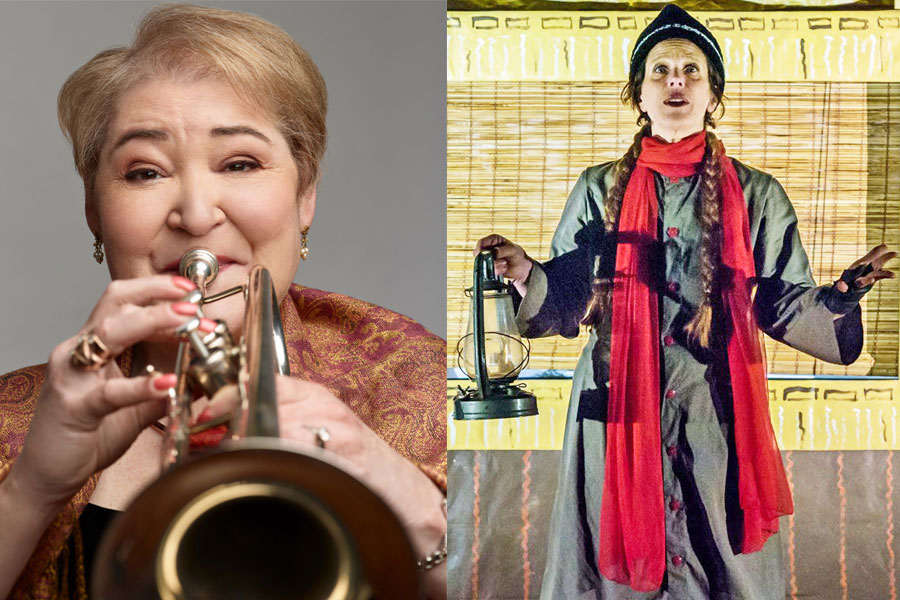When eleven female musicians take on the traditional Eastern European Jewish folk music of “Soul Songs: Inspiring Women of Klezmer” Oct. 28 at West Philly’s Annenberg Center, chutzpah certainly will be in the air.
Mostly, though, there will inclusivity and joy, as Jenny Romaine (a gay New York designer-director) and fourth-generation Philly klezmer legend trumpeter Susan Watts reteam for the second time in their career.
PGN: Jenny, you were a musical director of Circus Amok and brought in Susan as a band member — Circus Amok being a queer politicized circus spectacle. How did you like working together, and how do you believe this set the stage for the klezmer piece you are working on currently?
JR: I think my working relationship with Susan has always been queer in that, with her and through her work, I felt free of limitations on being a woman, an artist, a creator of non-text-based Yiddish theater, a disturber of the peace, a community builder. Susan, in my heart, was a trumpet princess. She was a sexy, Betty Boop, warrior, a femme spiritual and musical defender of we who are not traditionally valued. Susan is a mighty source of power. Music power, soul power, sass power, working-class power, sexy and in charge. Queerness (unlimited political, social, erotic, linguistic, decorative, historical desire) was the center of that world, not the margin. Circus Amok is similar to our Yiddish scene in that it is bold, street-savvy, rooted in tradition, multigenerational, people-loving and live. Working together in Amok, Susan could see this aspect of our work in Yiddishland taken to great heights and pie-in-the-face lows, and performed by and for all kinds of people. In NYC, Susan also became friends with several of the queer and trans artists who are working on my team.
SW: Working with Jenny was a bounty of learning. She taught me so much about listening to music differently, about the relationship between physical action and music. Her music directorship is different than what she is doing in Soul Songs, which is all visual.
PGN: Why klezmer? What importance does it hold in the present day? How do you explain this sound, this sensation to those outside the Jewish religion?
JR: I am interested in creating cultural spaces that hold new values, .spaces creating strategies for removing violence and other forms of social death, while exploring what outfit the new will be wearing! My medium is highly ornamented and inspiring storytelling. I believe that the kind of changes that we need to make socially and politically happen through paradigm shifts. Interventions. My experience with experimental art and tradition show me that to create something new I have to have a relationship to my ancestors. This relationship with the past can be as creative as my ideas of the present and future. Make it vital with deep exploration. archival material, sacred texts, literature, textiles, folk belief. Use collage techniques, all compositional tools I encounter. Stay connected to tradition. Pay attention to integrity of traditional form. Let yourself evolve.
SW: Klezmer isn’t a religious music. It’s celebratory music and it isn’t liturgical. Klezmer didn’t and doesn’t happen in the synagogue. Klezmer has to do with centuries of heritage. Time after time, through the centuries, some poet has tried to annihilate the Jews. This music has survived as have the people. It’s a connector to that history; it’s the music of a people from Ashkenazi descent. The sounds of klezmer are all feeling sounds. It’s happy, joyous, sad, pensive, funny, introspective, sexy, evocative and danceable. Just like salsa or African drumming, or reggaeton, it’s world music with a history and it’s relevant today. One of the ways current klezmer is fresh is through the use of chords and through modern instruments. Today’s chord changes are more complex and you would never hear an electric guitar play klezmer 100 years ago.
PGN: One of you identifies as gay/LGBTQ, one does not. How does sexuality and identification figure into klezmer or your view of it?
JR: I was around in the earlier years of the revival. The leadership of LGBTQ artists and scholars was as clear as folk. To reach across the chasm of cultural destruction, assimilation and the heavy presence of Zionism/Hebrew language to say we’re here. To create relationships with the past and the dead and elders that were dazzling like stars. That is queer desire, queer family, queer time, potential for so many kinds of creative relationships to be forged through art and culture and critical thought. Another practice that allowed this space to be held were traditions of political organizing — including LGBTQ / feminist liberation — that, of course, included erotic and playful embodied practices, like summer-camp culture and parody poetry and spectacle.
SW: Klezmer culture is an inclusive culture that welcomes anyone regardless of anything.
“Soul Songs: Inspiring Women of Klezmer” will be held 4 p.m. Oct. 28 at Annenberg Center for the Performing Arts, 3680 Walnut St. Tickets: $29-$49; www.annenbergcenter.org
